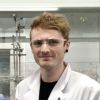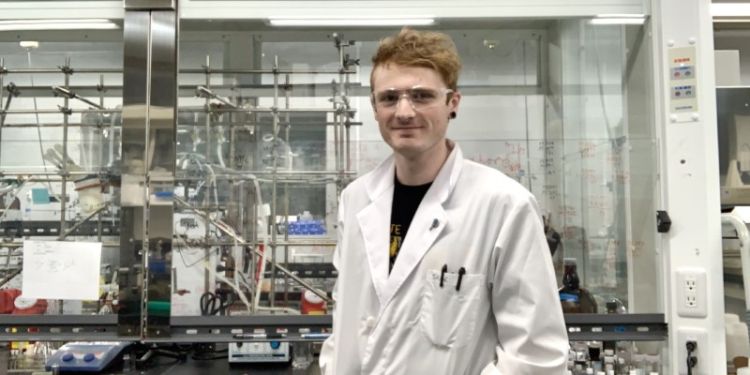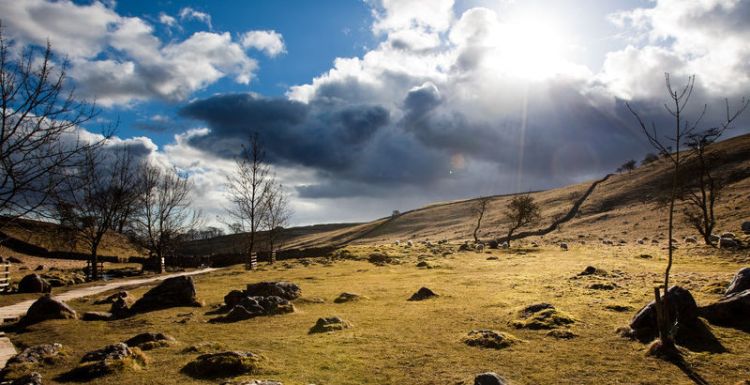
Jake Hauser
- Course: Chemistry with Study Abroad MChem, BSc
- PhD title: LALDI tags: ionization enhancers for mass spectrometry–based glycomics
- Year of graduation: 2015
- Job title: JSPS Postdoctoral Research Fellow
- Company: Kyoto University
Jake Hauser graduated from Leeds in 2015 with a degree in Chemistry with Study Abroad MChem, BSc. He continued his studies at Leeds and completed his PhD in Organic Chemistry in 2019 before embarking on his Postdoctoral Research position at Kyoto University.
Undergraduate life at Leeds
Jake chose the Chemistry programme at Leeds because he had always been interested in the subject at school and especially enjoyed the practical side of chemistry. He said, “The University of Leeds stood out particularly well in that sense, offering more practical lab time as part of the Undergraduate course than any of the other Universities I had visited.
I always knew that the practical aspect of chemistry appealed to me, so getting all that experience from the very beginning was really great. Being able to take the theoretical learning and then apply it practically so frequently made it feel like my degree wasn’t just book learning, but that I was actually training to become a chemist.

I also chose Leeds because I think that Leeds is an amazing city to live in. Compared to a lot of the other cities I visited, I felt like Leeds had everything I could possibly want. It has a great music and nightlife scene, the cost of living seemed pretty reasonable, the Yorkshire Dales is right on the edge of the city, and the Leeds Student Union seemed to cater for just about every possible thing I could ever imagine wanting to get involved in.”
The University of Leeds stood out particularly well... offering more practical lab time as part of the Undergraduate course than any of the other Universities I had visited.
Student life
“Throughout both my undergraduate and postgraduate years at Leeds, I was very involved with the Leeds University Snowsports Society, Leeds Snowriders, both on the social side and representing the university at BUCS British Universities & Colleges Sport competitions both in the UK and abroad.
During my PhD, I helped run the Leeds Postgraduate Chemistry Society, eventually taking over as President, and took part in organising social events like the weekly coffee mornings for postgraduate students and the annual trip to the Yorkshire Dales, as well as coordinating with the admin staff to organise the annual Postgraduate Chemistry conference. Outside of the University, I used to organise live music shows in the local music scenes. I think even throughout my most academically busy or challenging times at Leeds, like writing my thesis, having a solid social outlet was very important to me in order to be able to decompress and manage any work related stresses.”

During my PhD, I helped run the Leeds Postgraduate Chemistry Society, and took part in organising social events like the weekly coffee mornings for postgraduate students and the annual trip to the Yorkshire Dales.
Gain world-experience
Jake undertook his year abroad studying at the Simon Fraser University in Vancouver, BC Canada. He found the experience a great way to broaden his outlook on life, and the best aspects was “the opportunity to live in another country, and experiencing something entirely new.”
He added, “Even though I still had studying and a lot of work to do, it did still feel like I had the best holiday of my life. I made so many great connections during that time, both socially and academically, so now I always feel like I have a strong tie to the city and country.
It’s probably a bit cliche, but if any students are considering studying abroad, just do it. Get out as much as possible. Throw yourself into every opportunity that arises. It can be a bit intimidating when you’re in a new country to just go out on your own, but that’s totally understandable.Try to get involved with your University and the city or country you’re in through events or societies outside of the exchange programme. You’ve got a year or less to be there, so try to make the most of it.”
Postdoctoral research
“The School of Chemistry at Leeds seems to be very invested in helping those who want experience working in a research lab. I was given the opportunity to undertake two separate paid summer research projects during my undergraduate, and I honestly feel that experiences I had, and the support and advice that I received from the supervisors and other lab members during those projects strongly influenced my decision to pursue a career in academic research. Not only did they help to inform my decisions about pursuing a postgraduate degree by showing me what it would be like, but the fact that I had been involved in two competitively funded research projects during my undergraduate years was very helpful for both my PhD and postdoctoral fellowship applications.”
After completing his PhD in Organic Chemistry on developing pyrene-based ionization enhancers for the detection of carbohydrates by Label- Assisted Laser Desorption/Ionization Mass Spectrometry (LALDI-MS), Jake went on to pursue a 3-month researcher position at the Leeds Institute of Cardiovascular and Metabolic Medicine (LICAMM), under the supervision of Dr Robin Bon and Professor Andrew Wilson, focusing on studying BCL2 family protein-protein interactions using ligand-directed photocatalytic proximity labeling techniques.
Not only did they (The School of Chemistry) help to inform my decisions about pursuing a postgraduate degree by showing me what it would be like, but the fact that I had been involved in two competitively funded research projects during my undergraduate years was very helpful for both my PhD and postdoctoral fellowship applications.
Shortly after that, Jake was awarded a Japanese Society for the Promotion of Science (JSPS) fellowship in Professor Itaru Hamachi’s group at Kyoto University for two years, and he’s been carrying out research there since Nov 2019.
“I feel that being given the opportunity to carry out a short research position as part of LICAMM before moving to Japan was very useful because it gave me a brief introduction into some of the biological experimental techniques and analysis that have become a regular part of my work here. As I have been interested in directing my research in a more interdisciplinary direction, specifically looking at the application of synthetic chemical molecules to solve problems in Chemical Biology, being given that opportunity to briefly help on that project was a great hands-on introduction to that type of research and an excellent first step towards making that transition.
I’m currently working as a Postdoctoral researcher in the Hamachi’s group, focusing on using ligand-directed protein labeling techniques pioneered by his group to study proteins implicated in the pathophysiology of cancer and neurodegenerative diseases. This work primarily involves the design and synthesis of chemical probes that can be used to interrogate endogenous proteins related to disease within a native biological system without the need for genetic engineering. Using this approach, its is possible to gain a much more accurate insight into the activity and biological interactions of the target compared to traditional techniques that are restricted to in vitro analysis in test tubes due to their use of recombinant proteins or genetic engineering.”
Advice and tips
“If you’re interested in Chemistry, then I would say just go for it! If you think you will consider taking either a Year in Industry or spending a Year Abroad, you should definitely do it. It’s a fantastic experience either way.”
Find out more
Discover more about our Undergraduate degree courses in the School of Chemistry.

